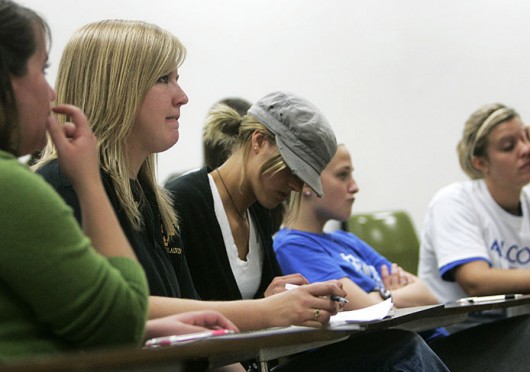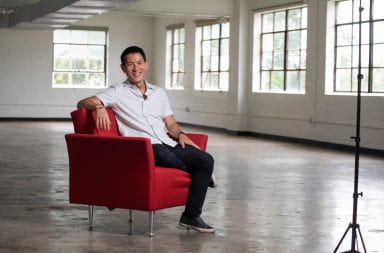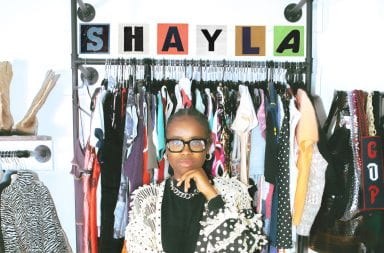
Resada Ward sits in a medical sociology lecture on the final day of class at Gustavus Adolphus, a small liberal arts college, May 13, 2009, in St. Peter, Minn.
Credit: Courtesy of MCT
Though some Ohio State students said they think others look down on their humanities or liberal arts majors, a recent study by the Association of American Colleges and Universities found graduates from those fields might be more successful than society claims.
“At peak earnings ages (56-60 years) workers who majored as undergraduates in the humanities or social sciences earn annually on average about $2,000 more than those who majored as undergraduates in professional or pre-professional fields,” like pre-med and pre-law, the study found, according to a press release.
Some Ohio State staff members, though, said that doesn’t surprise them.
“This is more encouraging than surprising,” said Todd Bitters, administrative director for advising services at the College of Arts and Sciences.
Bitters said he thinks the success of humanities and social science majors comes from the “soft” skills they acquire, such as creative, critical and analytical skills, which allow them to acclimate to dynamic work environments throughout their careers.
Zoe Smith, a second-year in history of art, said she has experienced her fair share of criticism. Smith said she thinks this is partly because of uninformed people who do not understand what her major or others like it really entail.
“Most people don’t realize how much work goes into being a history of art major. They think I just stare at paintings all day and braid my hair or something,” Smith said.
Although she might not spend every day sitting in chemistry lab, she said she spends hours learning and studying theories of art and various techniques. She said she wants to curate museums after she graduates.
Matthew Memming, a first-year in biochemistry, said he found the results of the study interesting.
“I’m not very surprised that someone majoring in liberal arts would make more than a pre-professional because even though the careers related to the liberal arts and pre-professional are completely different, they are equally important,” he said. “The liberal arts are more important than people give (them) credit for, and they should get paid just as much as anybody else in the professional world.”
The study also found the unemployment rate for recent liberal arts graduates is 5.2 percent, while the rate for mature workers who graduated with a degree in liberal arts (age 41-50) is 3.5 percent.
Bitters found this encouraging and again attributed the low unemployment rates to “the adaptability of liberal arts students.”
The study also looked at the trends of these students going on to graduate school. The report found that nearly 4 million of those who hold a bachelor’s degree in a humanities or social science area also hold a graduate or professional degree, and see a $20,000 boost in earnings each year.
Bitters said he went to graduate school for English because he was interested in learning more about literature, but he said it’s not for everyone.
“Graduate school is not a necessary condition for meaningful, gainful employment right out of the undergraduate experience,” Bitters said.
Regardless of the statistics, he said what really matters is that students go into fields that interest them.
“I believe that students who study within a field that interests them tend to do better, academically and emotionally, than those who choose a field only for its perceived earning potential,” Bitters said.
Smith has a similar feeling after changing her major from international studies to history of art this past fall.
“I’ve never regretted changing my major to pursue what I love. When people make comments to me, I like to thank them because their comments give me the energy and faith in myself to show them how successful I will be in my chosen field,” she said.


